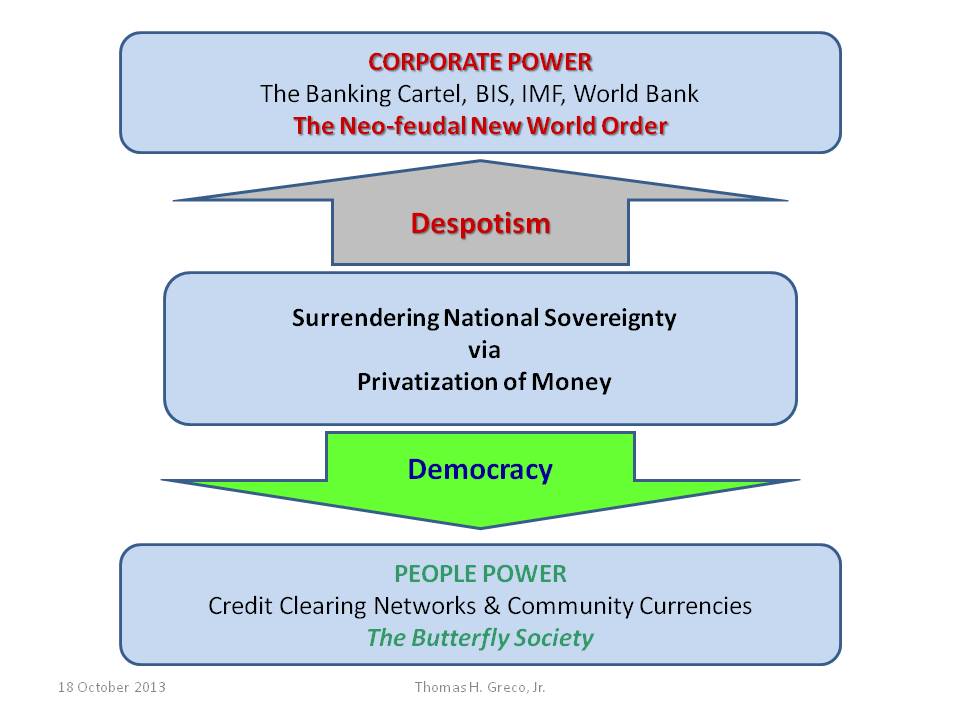Greece and the Global
Debt Crisis
Thomas H. Greco, Jr.
ABSTRACT
The Greek debt crisis is emblematic of a more general, decades-long pattern of economic exploitation and reactionary politics that threatens not only the European Union but the stability of the global financial infrastructure and Western democratic civilization. The situation calls for a different form of globalization, not one that is dominated by transnational banks and corporations, but one that is built upon local self-determination and self-reliance, and based on local and domestic control of money, credit, and finance. Greece (and other debtor countries) can recover a measure of sovereignty and rebuild its economy by combining “debt triage” with public and private actions for creating domestic liquidity.
In the summer of 1977, I first ventured abroad from North America on a journey to explore ancient civilizations, cultures, and religions, and to experience contemporary life in Egypt, Israel, and Greece. During my six-week odyssey, I was able to visit the Pyramids, amble over the Holy Land, and visit the temple ruins of Athens and Delphi.
At one point while in Cairo I came upon a scene that greatly troubled me. There was a small burro hitched to an enormous cart that was laden to the hilt with onions. I felt nauseous as I watched the poor animal lying on its side being flogged by a man in a vain effort to rouse it to the task of moving what seemed to be an impossible load. As a stranger in a strange land, I felt helpless to intervene and quickly moved away. I often wonder what might have been the ultimate outcome, but in my imagination I see the man with the whip standing over the lifeless body of that animal lying in the street, and weeping in worry and frustration.
Now, when I contemplate Greece’s current predicament, that image comes to mind. I see Greece as that beaten and dying animal, overburdened with debt that is beyond its capacity to service, and being flogged by its creditors in a vain attempt to get it to pay up. In my mind’s eye I see a future in which the dead carcass of Greece is being carved up and distributed amongst the creditor institutions. In actuality, Greece will survive, but under new (foreign) management, as she is forced to sell off her assets at fire-sale prices.
In the eyes of the Germans and other creditors, represented by the so-called “troika” institutions (the European Commission, the European Central Bank, and the International Monetary Fund), the Greek people are lazy freeloaders who have been living “high on the hog” at their expense, and who now balk at repaying what they borrowed.
But there is another side to the story that paints a different picture, and even if there is a bit of truth in that characterization, what is there to be gained by creditors insisting upon their “pound of flesh”? As civilization has advanced, debtor prisons have been eliminated and bankruptcy laws have been instituted to protect people and companies from creditors who insist upon collecting more than debtors, for whatever reason, are able to pay. Why can’t nations be afforded the same considerations?
First of all, it was not the Greek people who did the borrowing, it was a series of Greek governments that were either corrupted, coerced, or seduced into taking on a series of debts that were increasingly burdensome. Greece was lured into the debt trap from which it seems impossible to escape. Ellen Brown has summarized in her article, The Greek Coup: Liquidity as a Weapon of Coercion, some of the many moves that were made to ensnare the Greek government, and by extension, the Greek people. My prescriptions are detailed in my full article, Greece and the Global Debt Crisis that was included in the anthology, Rebuilding after Collapse: Political Structures for Creative Response to the Ecological Crisis, edited by John Culp. –t.h.g.





